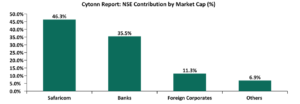The Nairobi Securities Exchange (NSE) has been on an eight-year Initial Public Offers (IPOs) drought, having recorded the last IPO in 2015, when Stanlib Investments issued an IPO of the first Real Estate Investment Trust (Fahari-Ireit) at the bourse, managing to raise Kshs 3.6 bn against the target of Kshs 12.5 bn, 28.8% success rate.
The graph below shows Kenya’s IPO activity for the period from 2012-2022, according to the PwC Africa Capital Markets Watch;

The most recent activity at the bourse was the listing by introduction (meaning no money was raised) of the Local Authority Pension Trust (LAPTRUST) Imara Income Real Estate Investment Trust (I-REIT)), under the Restricted Sub-Segment in 2022.
Given that a few large-cap stocks such as Safaricom PLC, Equity Group Holdings, KCB Group Ltd, and East African Breweries Ltd hold almost 75.0% of the total market capitalization, the market remains volatile, which presents a risk of a market collapse due to concentration risk.
The chart below highlights the contribution of stocks at the Nairobi Securities Exchange;

Read: NSE Issues Profit Warning For 2022
We believe the reason behind its failure to attract IPOs is because the measures undertaken have not been able to address the real impediment to listings, focusing mainly on tax exemptions whilst there are a number of deep underlying issues that still need to be remedied, in order to make the country’s capital market robust.
Some of the key issues we believe the authority need to address in order to attract more IPOs include;
1. Shallow market: The Nairobi Securities Market is regarded as a shallow market since it only offers a few instruments and limited liquidity, leaving firms with minimal financing options.
The strength of securities markets that make them crucial in the growth of an economy, is their capacity to mobilize long-term savings for financing long-term projects and encourage broader ownership of firms.
The intermittent trading of only a few stocks held by a small number of investors makes the NSE less efficient. In comparison to other nations like South Africa, which has a total of 350 listed companies, NSE still lags behind having only 66 listed companies.
Moreover, the market still lags behind in terms of liquidity due to overreliance on a few stocks thus discouraging listing as companies with the potential to list stay away out of fear of having failed IPOs,
2. Rigid regulatory framework: The regulatory structure in Kenya’s capital market has been a key impediment to the penetration of capital market products as well as the introduction of new IPOs. The current regulations governing the capital markets securities, public offers, listing, and disclosure is the Capital Markets Regulations Act 2002 and do not meet the needs of the ever-evolving market.
However, the authority announced that is fast-tracking reforms to update the regulations and has issued the Draft Public Offers, Listing, and Disclosures seeking to address emerging issues and market dynamics in order to provide a more enabling environment in Kenya’s Capital Markets that will spur more listings in the Nairobi Securities Exchange.
Moreover, costs associated with compliance with the regulatory and corporate governance framework requirements have been a barrier to potential companies going public.
Additionally, most potential companies are reluctant to list since compliance with some of the regulations exposes the company to the public realm which they regard as a loss of competitive advantage.
3. The rise of Private Equity firms providing easily accessible capital: Kenya’s private equity sector has been thriving, with raising capital through private equity companies is on the upswing, making companies shy from listing due to the readily available capital.
According to African Private Equity and Venture Capital Association (APEVCA), Kenya recorded 54 deals with a value of USD 330.0 mn in H1’2022, coming behind only Egypt which recorded 63 deals with a value of USD 352.0 mn in H1’2022.
Private equity funding is more appealing than public floatation for many companies primarily because it allows companies to stay private as they continue to finance their businesses for expansion thus preserving the kind of decision-making power of its shareholders that is typically lost when businesses seek public listing.
4. Perceived high cost for listing: Most small and medium-sized companies shy from listing shares due to the perceived high direct cost in particular the annual listing fees of 0.06% of the market capitalization subject to a minimum of Kshs 200,000.0 and a maximum of Kshs. 1,500,000.0.
Additionally, due to lack of awareness, the small and medium-sized enterprises which are dominant in the Kenyan economy, depend mainly on bank loans despite raising capital through the capital markets being cheaper. According to a study by the CMA, the percentage cost of floating securities in the capital market is comparatively lower than bank lending rates.
Moreover, IPO costs have ranged from 1.9% to 10.6% from 2012-2016, with the floatation of Eveready at 10.6% being the highest while Deacons in 2016 at 1.9% being the lowest, compared to bank lending rates averaging at 12.4% as of October 2022 according to CBK monthly economic indicators.
Additionally, compared to bank loans, which are annual costs over the tenure of the relevant loans, the cost of floatation is a one-off cost
5. Size of companies: The Kenya economy is dominated by small and medium-sized companies, and the perception that mature companies are the ones that are in a good position of issuing IPOs makes the small and medium-sized companies reluctant to list for fear of having unsuccessful IPOs.
This is an indication that startup companies are not growing big enough to the capacity that would make them attractive to investors during IPO’s which is the main reason the informal sector still dominates the economy
6. Loss of control: Many companies particularly those that are family owned or closely held are reluctant to list due to fear of dilution of ownership as well as losing their voting control.
The companies typically rely on bank finance to raise additional capital when required. Additionally, most companies avoid going public due to constant pressure from public shareholders.
Unlike the original owners, public shareholders usually take a short-term position and they are more concerned with seeing constant rises in the stock’s price so they can sell their shares for a profit.
7. Overreliance on Banks for funding over capital markets: In developed economies, most businesses are funded through capital markets with capital markets funding accounting for 60.0% compared to funding through banks at 40.0%. However, in Kenya, it is the opposite, with capital markets contributing 1.0% while banks account for 99.0%.
Aside from the statistics, there is a notion that banks rather than the capital markets control the economic agenda, instead of both having equal weights towards the growth of an economy.
Read: Imara I-REIT Lists At NSE After CMA Announced Relaxation Of Rules
Recommendations to remedy the low number of listings
From the issues identified, we are of the view that the following should be done to facilitate growth in the number of new listings as well as the development of the Nairobi Securities Exchange:
i. Making changes to regulations that do not meet objectives: The current regulations governing the capital markets securities, public offers, listing, and disclosure is the Capital Markets Regulations Act 2002, however, the authority is keen on fast-tracking reforms that will make listing attractive, in order to break the 8 year IPO drought.
Therefore, CMA should continuously review, identify and amend restrictive provisions in the capital markets and related Laws that are unattractive to capital raising and listing to ensure the rules in place facilitate rather than deter active participation in the markets.
This includes rules such as restrictive regulations inhibiting the participation of investors. For example, the minimum amount an investor can put in a DREIT at Kshs 5.0 mn.
ii. Fast track Privatization of State-Owned Enterprises: In October 2022, the new administration announced plans to privatize 6 to 10 of State Owned Enterprises (SOEs) in the agricultural, energy, and financial sectors, within 12 months. However, it is four months down the line, yet there are no actionable results.
This also comes on the back of the previous regime’s plans to privatize up to 26 SOEs, yet none was achieved. As such, there is a need for the government to fast-track the process in order to revitalize the capital markets and increase trading activities at the bourse
iii. Promote investment in Small and Medium Sized companies with growth potential: Following the increasing number of Small and Medium Sized companies, financing them through the securities exchange is key to the growth of an economy. However, the challenge usually arises in onboarding investors who are willing to take the risk in these types of companies given some of them have low-profit history while others are less liquid.
However, some of the ways that can be used to promote and expand small and medium-sized enterprises, include; Introduction of tax incentives for investors willing to invest in small and medium-sized companies to facilitate financing and boost liquidity and growth.
iv. Market Transparency: The degree to which markets are transparent affects investors’ decision-making. Transparency of trading allows efficient price setting and thus increases confidence in the market. Therefore, it is key for the regulator to enforce measures that raise the level of transparency in the market in order to make it more attractive to investors.
This will help to boost its liquidity and consequently attract potential companies who are reluctant from going public due to the inefficiency in the market.
v. Creating a culture of participation in the stock market: It is essential to disseminate knowledge of having a candid stock market through the listing of more companies in order to broaden the financial markets. This can be implemented by having a specific day in a calendar for financial education where the general public is educated on the importance of investment and financial culture.
vi. Improving tax incentives for new listings: The authority needs to develop measures that are favorable to go public that will enable it to attract more companies and have a powerful and more developed securities market. In order to attract more listings the authority needs to improve its tax treatments for dividends as well as capital gains.
vii. Training and offering independent and free assessment to companies: In order to attract more listings, the authority needs to offer training on matters of financial transparency, sustainability, and corporate governance to potential companies as well as offering free assessment in order to help them position themselves for transitioning to the public markets.
viii. Simplify regulations and make it easier to access listing at the securities exchange market: The simplification of obtaining listing can encourage companies to go for listing at the stock market and take the advantage of public finance in the market to gain size and boost growth than private financing through risk or venture capital. The general cost of listing should also be reduced in order to make it more favorable and appealing for IPOs.
For more information, please see our Unlocking New Listings on Nairobi Securities Exchange & Cytonn Weekly #02/2023


















